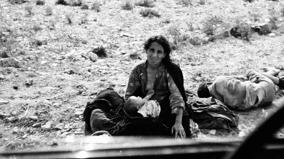New release
Coming
None
Korea, After the War
1954
15 min
Leaving soon
Fred Davis takes a look at Korea in 1954, and gives a sobering account of the realities of war as they affect the Korean population. He sees the primary industries of agriculture and fishing in ruins, towns and villages destroyed, thousands of homeless and orphaned children left to survive as best they may. At the docks of Inchon harbour, previously the landing base for United Nations troops, Davis interviews two officers of UNKRA (United Nations Korean Relief Administration) and learns about this organization's aid program in war-torn Korea.

-
 On the Spot1950 20 films
On the Spot1950 20 films
Details
Fred Davis takes a look at Korea in 1954, and gives a sobering account of the realities of war as they affect the Korean population. He sees the primary industries of agriculture and fishing in ruins, towns and villages destroyed, thousands of homeless and orphaned children left to survive as best they may. At the docks of Inchon harbour, previously the landing base for United Nations
troops, Davis interviews two officers of UNKRA (United Nations Korean Relief Administration) and learns about this organization's aid program in war-torn Korea.
-
directorBernard Devlin
-
producerBernard Devlin
-
photographyJohn Foster
-
editingMarion Meadows
-
hostFred Davis

















